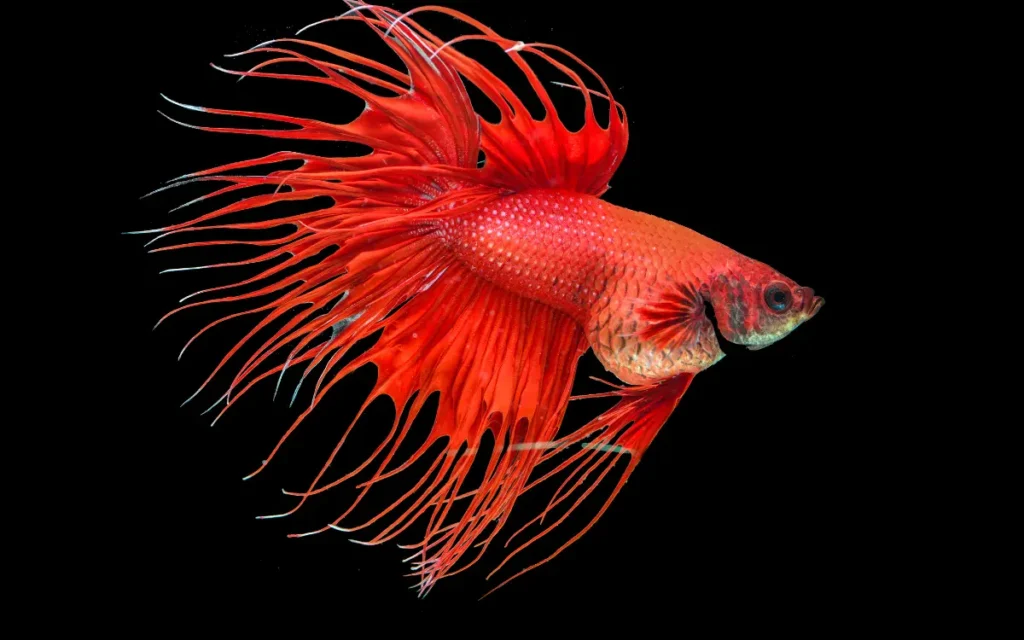A community fish tank is an aquarium where peaceful fish of different species live together without aggression. The best community fish include Neon Tetras, Cory Catfish, Guppies, and Dwarf Gouramis. These species are easy to care for, thrive in groups, and get along with other gentle fish, making them ideal for beginner and planted tanks.
Best Peaceful Fish for Community Tanks
1.Cory Catfish (Corydoras)
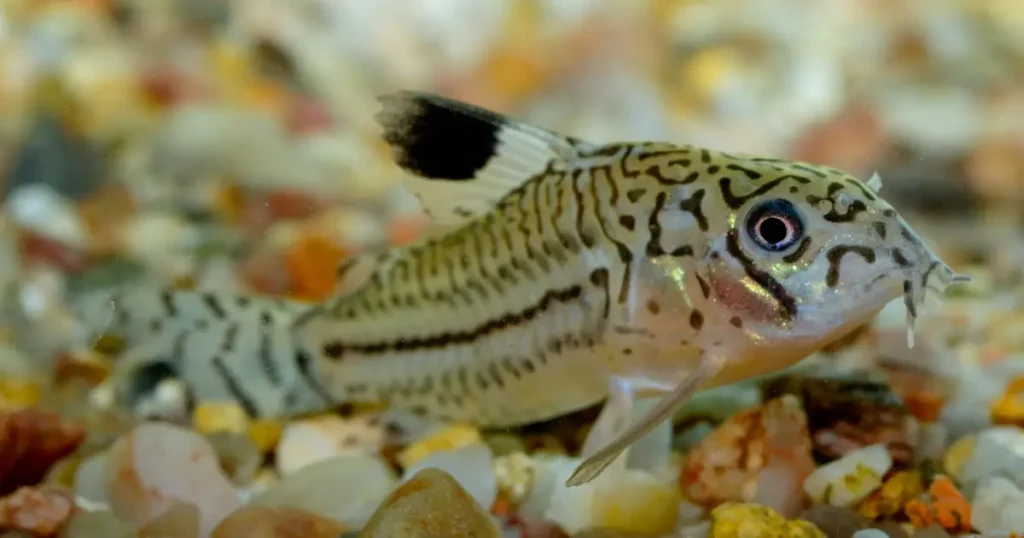
Cory Catfish are peaceful bottom-dwellers that bring both charm and function to community tanks. Known for their gentle nature, they happily scavenge the substrate for leftover food, helping to keep the tank clean. Corydoras are social fish that thrive in groups of six or more, and their playful behavior is fun to watch. They do best in tanks with soft, sandy substrate that protects their sensitive barbels. A well-planted setup with hiding spots will make them feel secure.
- Minimum Tank Size: 20 gallons
- Tank Position: Bottom
- Temperature: 72–78°F (22–26°C)
- pH Range: 6.0–7.5
- Best Tank Mates: Neon Tetras, Guppies, Mollies, Platies, Otocinclus
- Why Choose This Fish? Active cleaner that reduces uneaten food, social behavior adds life to the tank, great fit for planted aquariums
👉 Tip: Choose smooth décor and fine sand to prevent injury to their barbels.
2.Neon Tetra (Paracheirodon innesi)
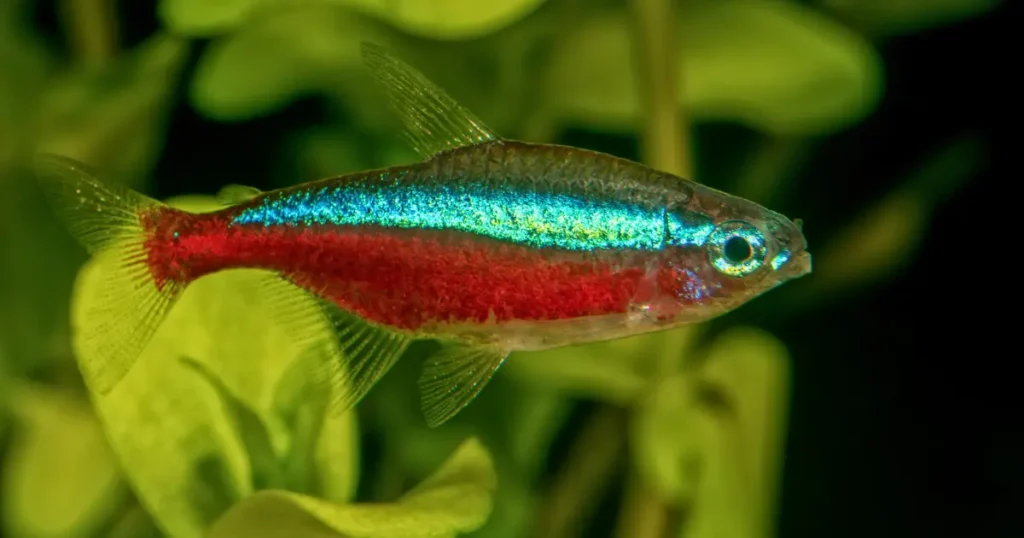
Neon Tetras are one of the most popular community fish, loved for their vibrant blue and red stripes that shimmer in aquarium lighting. These small, peaceful fish thrive in schools of at least eight, where they feel safe and display natural, synchronized swimming behavior. Neon Tetras prefer tanks with soft, slightly acidic water and plenty of plants, which help them feel secure. They are best suited to calm tanks without fin-nipping species.
- Minimum Tank Size: 10 gallons
- Tank Position: Midwater
- Temperature: 70–81°F (21–27°C)
- pH Range: 6.0–7.0
- Best Tank Mates: Cory Catfish, Guppies, Rasboras, Otocinclus, Cherry Barbs
- Why Choose This Fish? Brilliant schooling display, peaceful nature, ideal for planted community tanks
👉 Tip: Keep them in larger groups to prevent stress and encourage their tight schooling behavior.
3.Guppy (Poecilia reticulata)
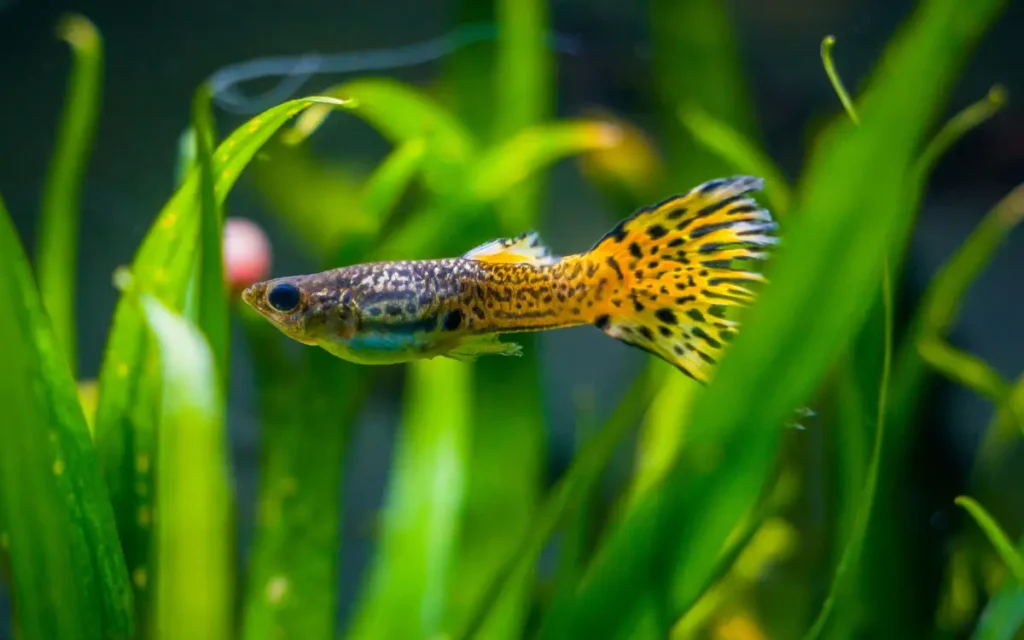
Guppies are among the most adaptable and colorful freshwater fish, making them a favorite for community aquariums. These small, active swimmers bring constant movement and vibrant color to the tank. Guppies are livebearers, so they can quickly multiply in the right conditions. They do well in peaceful community setups and thrive in tanks with stable water conditions and gentle filtration.
- Minimum Tank Size: 10 gallons
- Tank Position: Top to midwater
- Temperature: 72–82°F (22–28°C)
- pH Range: 6.8–7.8
- Best Tank Mates: Platies, Mollies, Corydoras, Neon Tetras, Otocinclus
- Why Choose This Fish? Hardy, colorful, easy to breed, and active — perfect for beginner-friendly community tanks
👉 Tip: To avoid uncontrolled breeding, consider keeping only males, or monitor breeding closely.
4.Platy (Xiphophorus maculatus / variatus)
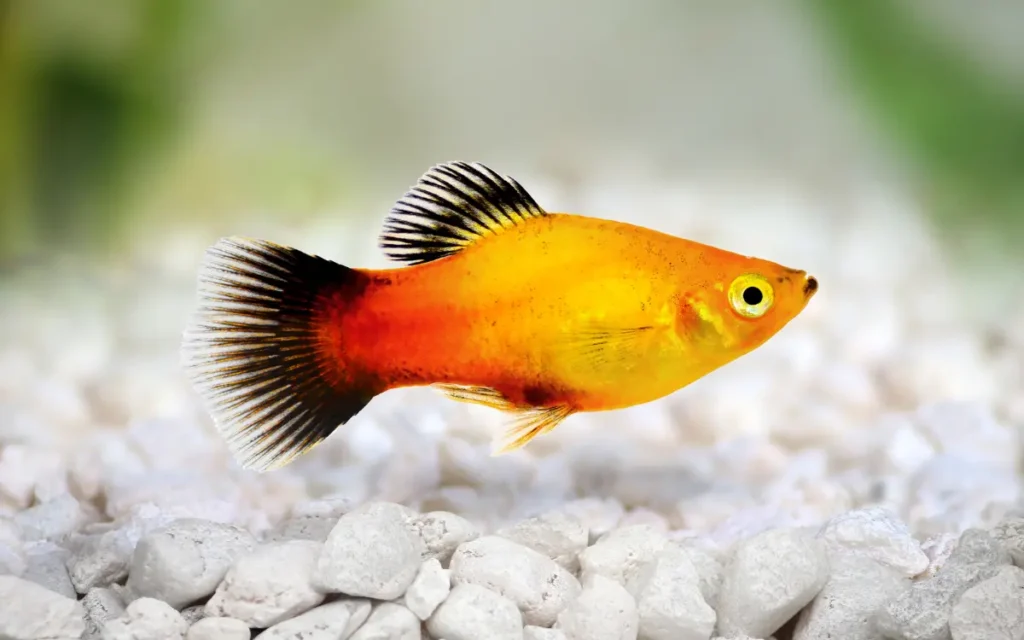
Platies are hardy, peaceful livebearers that come in many vibrant colors and patterns. They’re easy to care for and tolerant of a range of water conditions, making them ideal for beginner community tanks. Platies are social fish that do well in small groups and add lively movement to the aquarium. Their friendly nature makes them compatible with other peaceful species.
- Minimum Tank Size: 10 gallons
- Tank Position: Top to midwater
- Temperature: 70–77°F (21–25°C)
- pH Range: 7.0–8.2
- Best Tank Mates: Guppies, Mollies, Corydoras, Neon Tetras
- Why Choose This Fish? Colorful, hardy, and easygoing — a reliable choice for stress-free community setups
👉 Tip: Provide floating plants or décor for fry to hide if breeding occurs.
5. Zebra Danio (Danio rerio)
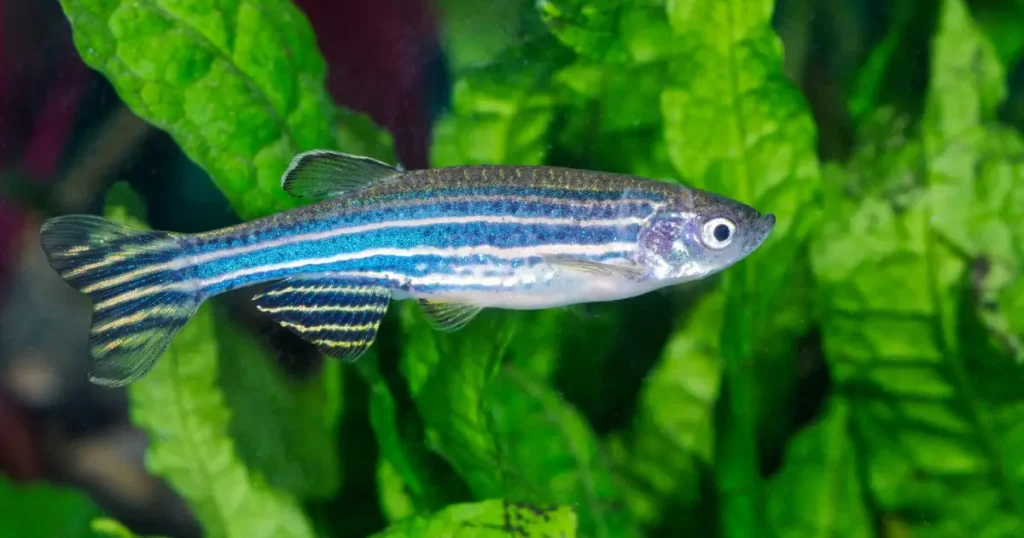
Zebra Danios are active, hardy fish known for their striking horizontal stripes and constant motion. These fish do best in schools of six or more and are great at adding energy to a peaceful community tank. They are adaptable to a wide range of water conditions and are ideal for new aquarists.
- Minimum Tank Size: 10 gallons
- Tank Position: Top to midwater
- Temperature: 64–77°F (18–25°C)
- pH Range: 6.5–7.2
- Best Tank Mates: Tetras, Corydoras, Barbs, Platies
- Why Choose This Fish? Extremely hardy, fast swimmers, and excellent for cycling new tanks
👉 Tip: Their fast, active swimming makes them a great choice for tanks that need lively activity.
6.Cherry Barb (Puntius titteya)
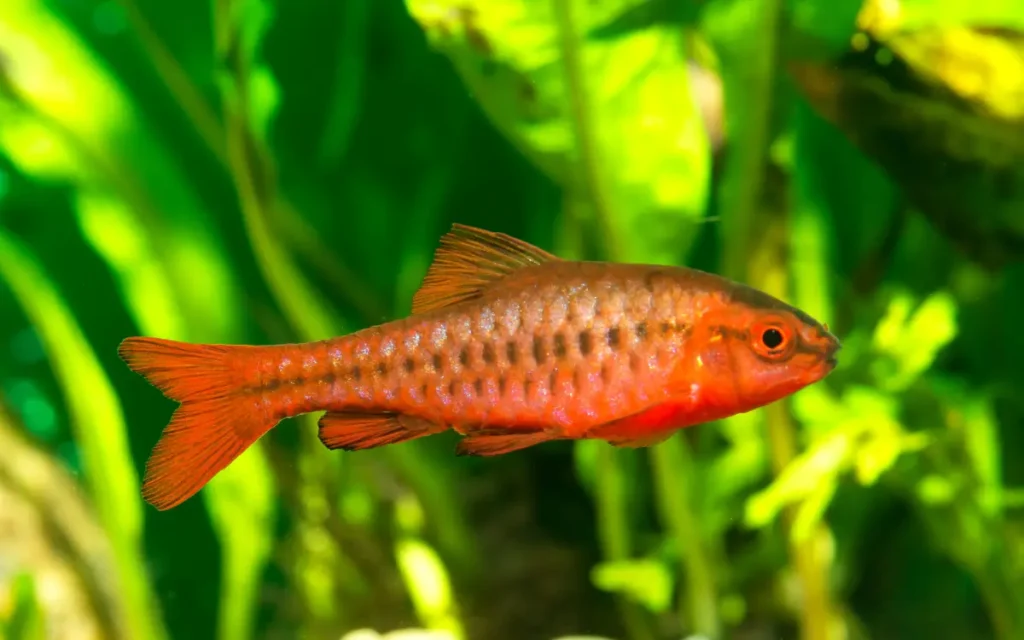
Cherry Barbs are peaceful, hardy fish that add a splash of red color to community aquariums. Unlike other barbs, they are gentle and do not nip at fins. They prefer to be kept in small groups and thrive in tanks with dense planting, which helps bring out their best coloration.
- Minimum Tank Size: 20 gallons
- Tank Position: Midwater
- Temperature: 73–81°F (23–27°C)
- pH Range: 6.0–7.5
- Best Tank Mates: Tetras, Rasboras, Corydoras, Gouramis
- Why Choose This Fish? Peaceful barb that’s beginner-friendly, hardy, and striking in color
👉 Tip: Males are brighter red during breeding; provide plants for natural behavior.
7.Dwarf Gourami (Trichogaster lalius)
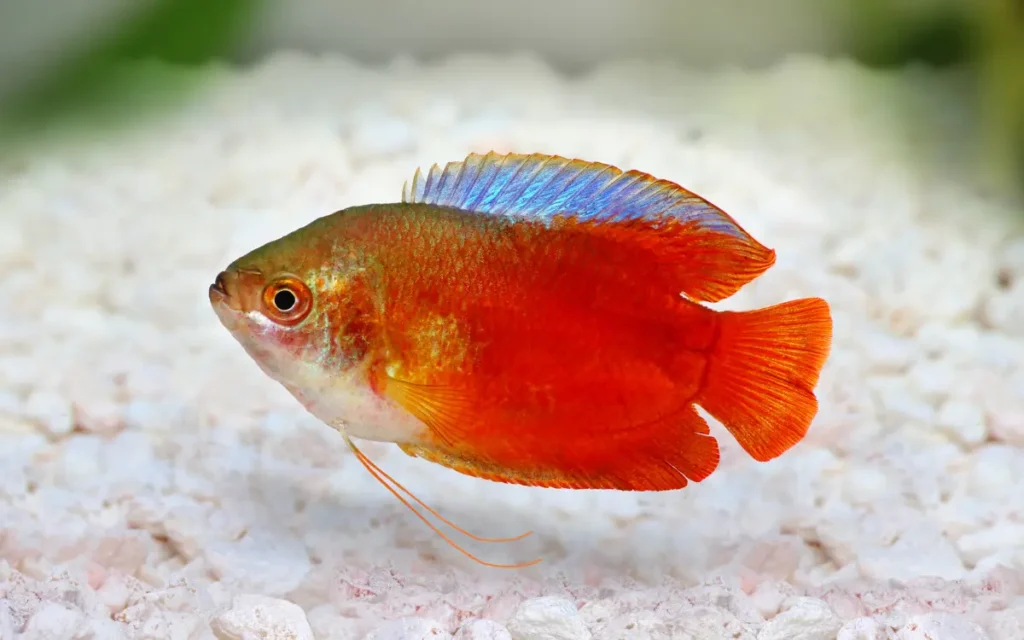
Dwarf Gouramis are peaceful centerpiece fish, prized for their brilliant colors and calm nature. They prefer well-planted aquariums with gentle flow and hiding spots. While generally peaceful, males can be territorial toward other gouramis, so they’re best kept singly or in pairs with non-aggressive tank mates.
- Minimum Tank Size: 20 gallons
- Tank Position: Mid to top water
- Temperature: 77–82°F (25–28°C)
- pH Range: 6.0–7.5
- Best Tank Mates: Rasboras, Tetras, Corydoras, Otocinclus
- Why Choose This Fish? Vibrant centerpiece, peaceful with other species, and thrives in planted setups
👉 Tip: Keep water quality high — Dwarf Gouramis can be sensitive to poor conditions.
8.Harlequin Rasbora (Trigonostigma heteromorpha)
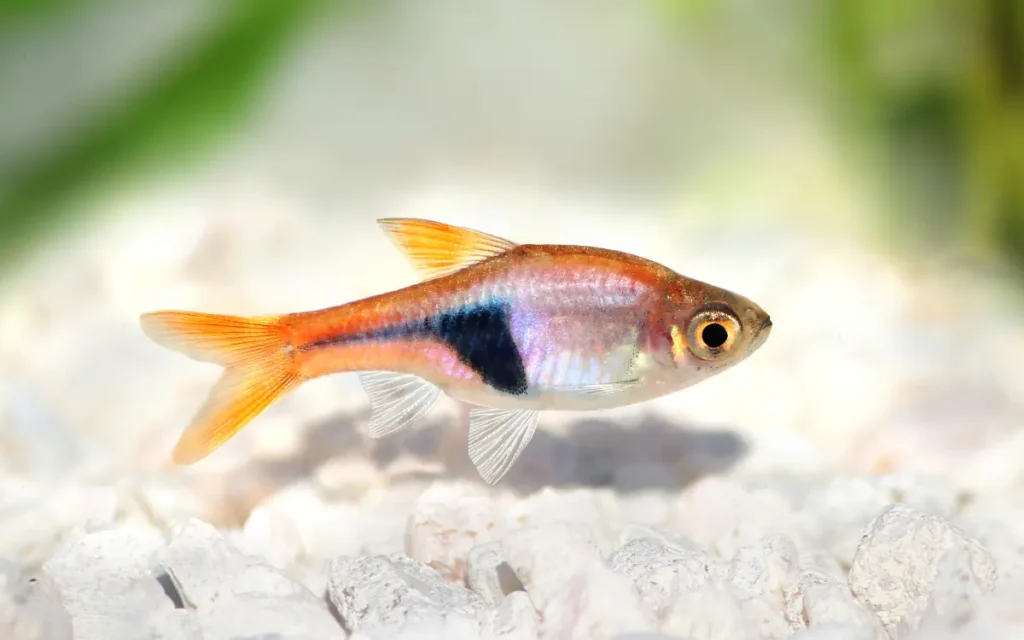
Harlequin Rasboras are small, schooling fish with a distinctive black triangle mark on their body. They add constant motion and sparkle to community tanks and feel most secure in groups of six or more. Their peaceful, hardy nature makes them an excellent choice for beginners and experienced aquarists alike.
- Minimum Tank Size: 10 gallons
- Tank Position: Midwater
- Temperature: 72–81°F (22–27°C)
- pH Range: 6.0–7.5
- Best Tank Mates: Tetras, Corydoras, Gouramis, Barbs
- Why Choose This Fish? Active schoolers, hardy, and easy to pair with other peaceful fish
👉 Tip: Live plants enhance their coloration and provide cover.
9.Pearl Gourami (Trichopodus leerii)
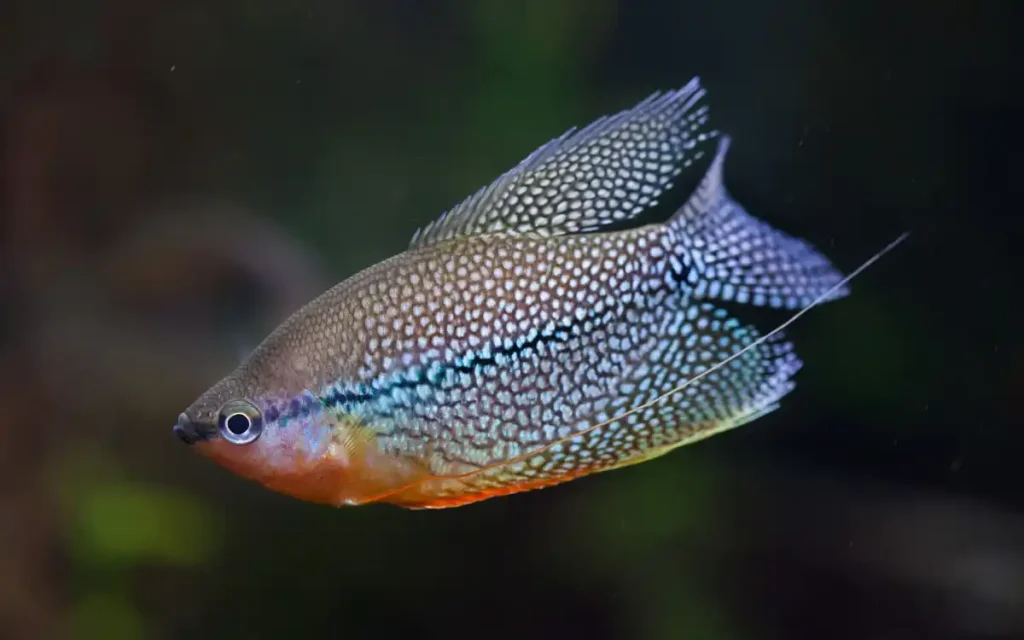
Pearl Gouramis are peaceful and elegant fish with a silver body covered in pearl-like spots. Males develop a red throat when breeding. They do well in community aquariums with gentle species and appreciate a well-planted environment with calm waters.
- Minimum Tank Size: 30 gallons
- Tank Position: Mid to top water
- Temperature: 77–82°F (25–28°C)
- pH Range: 6.0–8.0
- Best Tank Mates: Rasboras, Tetras, Corydoras, Loaches
- Why Choose This Fish? Stunning appearance, peaceful nature, and great for planted tanks
👉 Tip: Avoid aggressive or nippy species that might target their long fins.
10.Kuhli Loach (Pangio kuhlii)
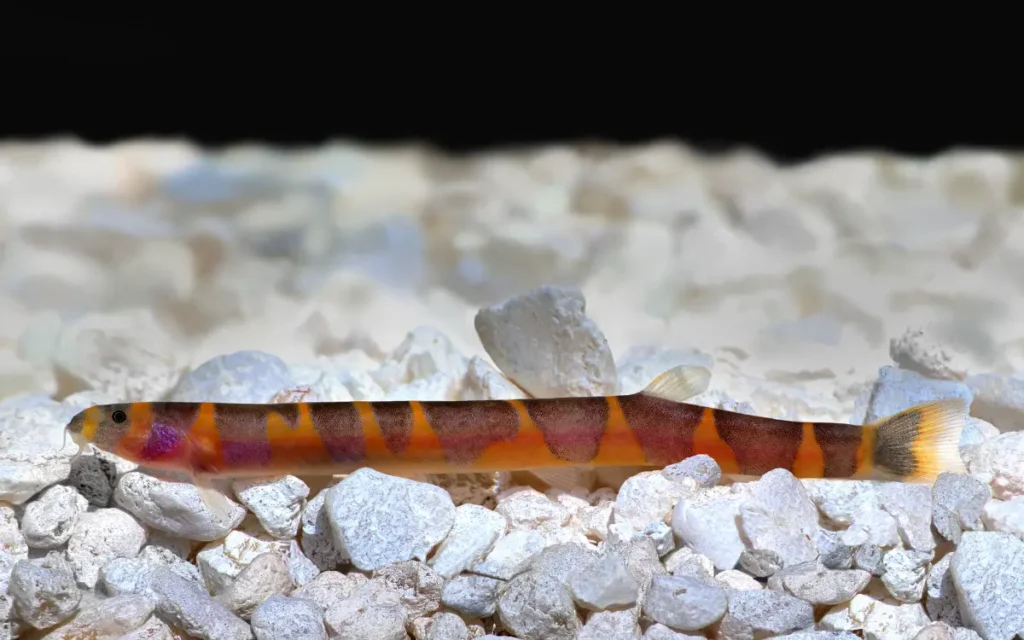
Kuhli Loaches are eel-like, shy bottom-dwellers that help clean up leftover food. They prefer to hide during the day and come out at night to forage. These fish thrive in soft substrate tanks with plenty of hiding spots like caves and dense plants.
- Minimum Tank Size: 20 gallons
- Tank Position: Bottom
- Temperature: 75–86°F (24–30°C)
- pH Range: 5.5–7.0
- Best Tank Mates: Tetras, Corydoras, Rasboras, Gouramis
- Why Choose This Fish? Unique appearance, peaceful scavenger, and great for planted or soft-bottom tanks
👉 Tip: Keep in groups of 3 or more so they feel secure.
11.Bala Shark (Balantiocheilos melanopterus)
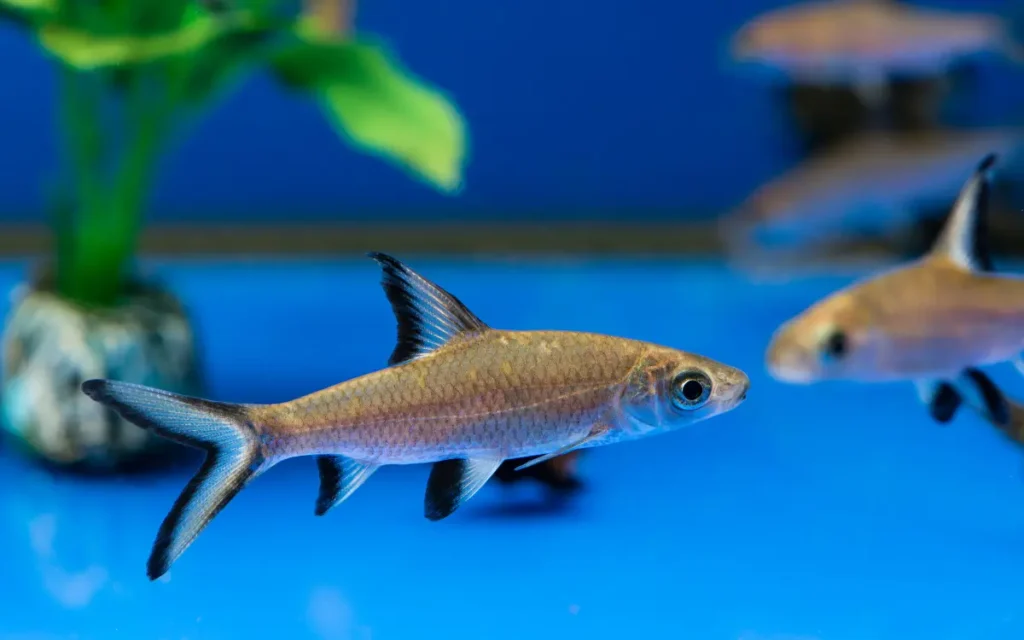
Bala Sharks are large, active fish that need spacious aquariums. They are peaceful despite their size and prefer to swim in groups. Bala Sharks are best for experienced aquarists with tanks large enough to accommodate their energetic swimming.
- Minimum Tank Size: 75 gallons
- Tank Position: Mid to bottom water
- Temperature: 72–82°F (22–28°C)
- pH Range: 6.5–8.0
- Best Tank Mates: Tetras, Rainbowfish, Corydoras, Gouramis
- Why Choose This Fish? Impressive schooling fish that adds movement to large tanks
👉 Tip: Provide open swimming areas and secure lids — Bala Sharks are known to jump.
12.Glass Catfish (Kryptopterus vitreolus)
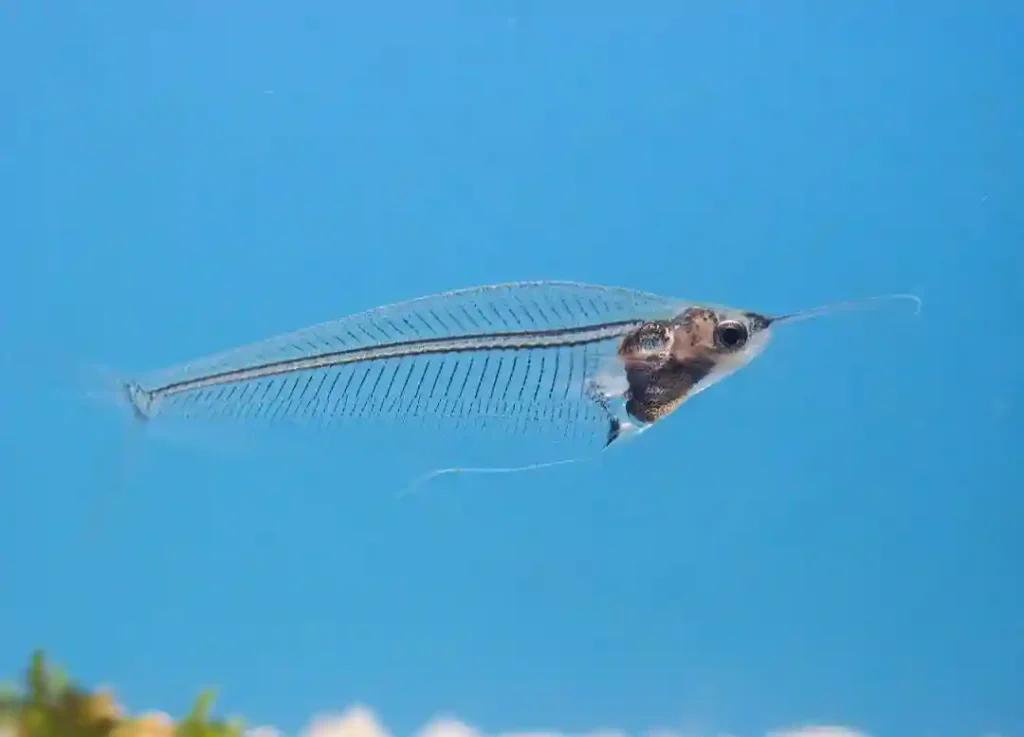
Glass Catfish are unique for their transparent bodies and delicate appearance. They are peaceful, shy fish that need to be kept in groups for comfort. These catfish thrive in stable water conditions and planted tanks that offer shade and shelter.
- Minimum Tank Size: 30 gallons
- Tank Position: Midwater
- Temperature: 75–80°F (24–27°C)
- pH Range: 6.5–7.5
- Best Tank Mates: Tetras, Rasboras, Corydoras, Loaches
- Why Choose This Fish? Fascinating look, peaceful schooling behavior, great for planted community tanks
👉 Tip: Avoid loud, fast-moving species that might stress them.
13.Pictus Catfish (Pimelodus pictus)
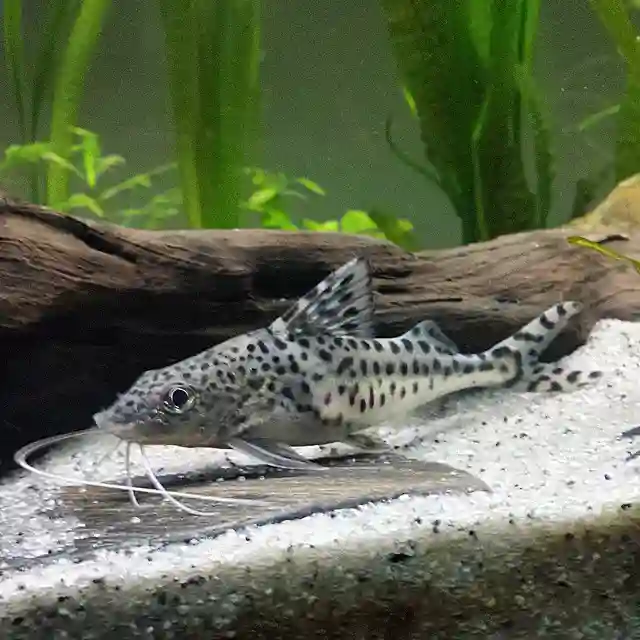
Pictus Catfish are fast, active bottom-dwellers known for their sleek silver bodies and long whiskers. They need a spacious tank and do best in larger community setups. Pictus Catfish are peaceful but can startle shy or slow fish with their quick movements.
- Minimum Tank Size: 55 gallons
- Tank Position: Bottom
- Temperature: 75–81°F (24–27°C)
- pH Range: 6.5–7.5
- Best Tank Mates: Bala Sharks, Rainbowfish, larger Tetras, Gouramis
- Why Choose This Fish? Lively, unique catfish that adds energy to bigger tanks
👉 Tip: Provide caves and driftwood for hiding during the day.
14.Otocinclus Catfish (Macrotocinclus affinis)
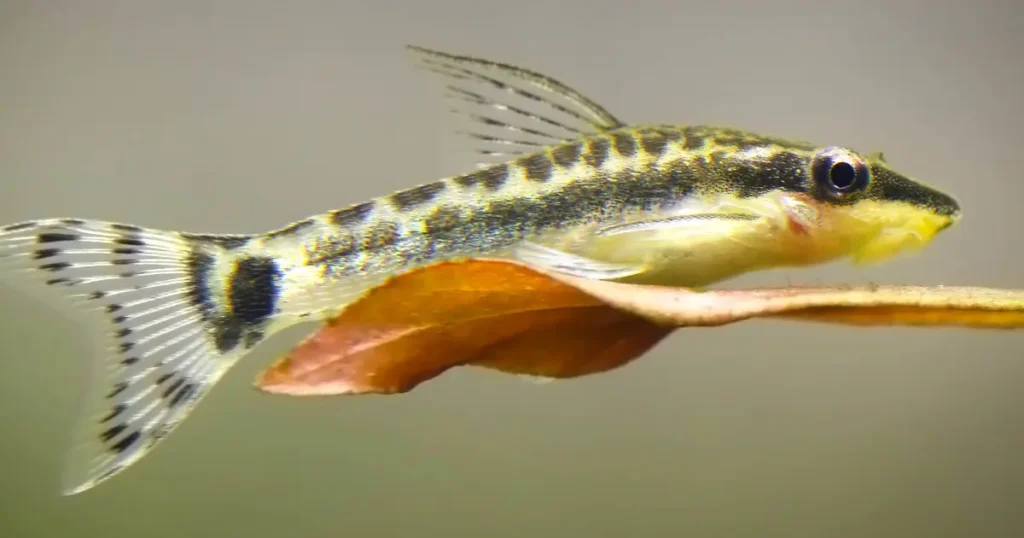
Otocinclus, or “Oto Cats,” are tiny, peaceful algae eaters perfect for planted community tanks. They’re shy but active in small groups and do best when kept in schools of 4–6 or more. These fish help keep algae under control without disturbing plants or other tank mates.
- Minimum Tank Size: 10 gallons
- Tank Position: Bottom and glass surfaces
- Temperature: 72–79°F (22–26°C)
- pH Range: 6.0–7.5
- Best Tank Mates: Tetras, Guppies, Corydoras, Rasboras
- Why Choose This Fish? Gentle algae cleaner, great for nano and planted tanks
👉 Tip: Oto Cats need a mature tank with biofilm or algae; supplement their diet if algae is low.
15.Celestial Pearl Danio (Danio margaritatus)
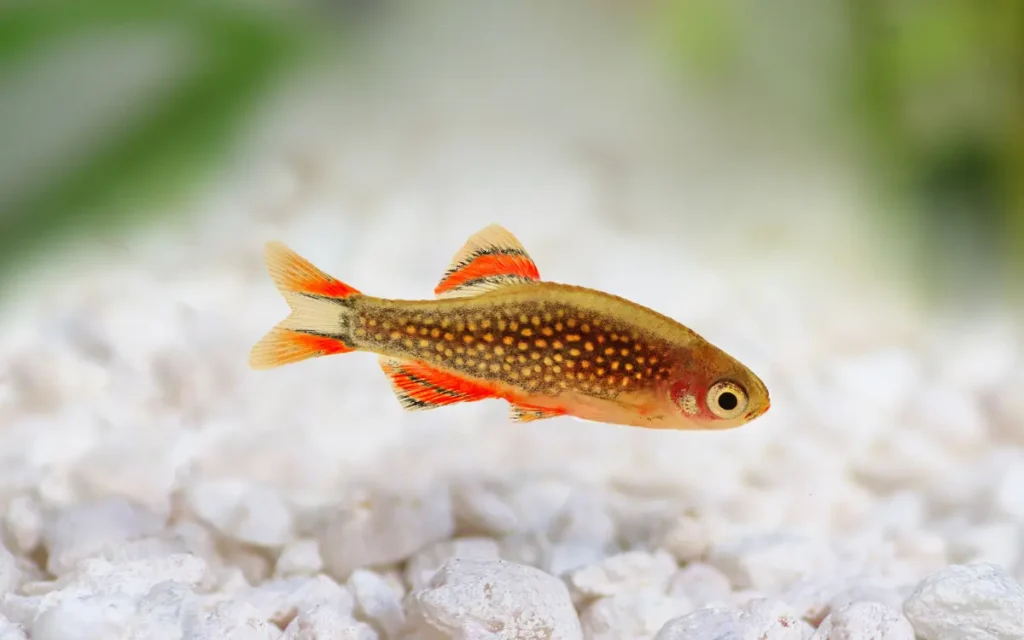
Celestial Pearl Danios, often called Galaxy Rasboras, are small, brilliantly patterned fish that add unique beauty to nano community tanks. They thrive in peaceful tanks with lots of plants and do best in groups of 6 or more.
- Minimum Tank Size: 10 gallons
- Tank Position: Midwater
- Temperature: 73–79°F (23–26°C)
- pH Range: 6.5–7.5
- Best Tank Mates: Otocinclus, Corydoras, Guppies, Shrimp
- Why Choose This Fish? Stunning patterns, peaceful nature, perfect for small planted tanks
👉 Tip: Provide dense plants and hiding spots to reduce stress.
16.Rummynose Tetra (Hemigrammus rhodostomus)
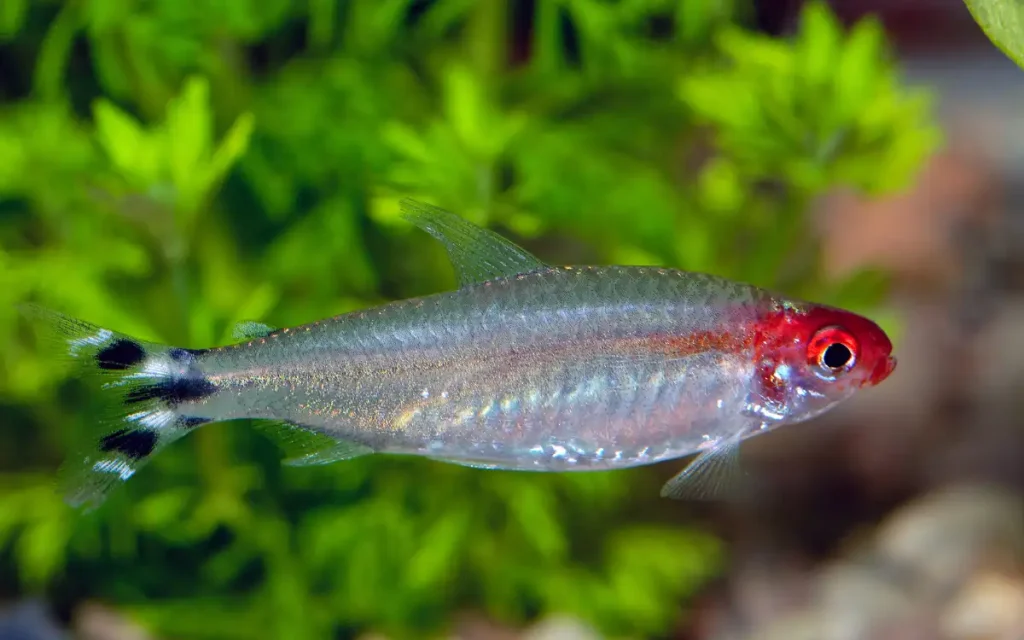
Rummynose Tetras are known for their bright red noses and tight schooling behavior. They are sensitive to water conditions, so stable parameters are key. When kept in schools of 8 or more, they form impressive synchronized groups.
- Minimum Tank Size: 20 gallons
- Tank Position: Midwater
- Temperature: 75–81°F (24–27°C)
- pH Range: 6.0–7.0
- Best Tank Mates: Corydoras, Rasboras, Dwarf Gouramis, Tetras
- Why Choose This Fish? Striking schoolers that create a dynamic display
👉 Tip: These fish are excellent indicators of water quality — a pale nose can signal stress.
17.Honey Gourami (Trichogaster chuna)
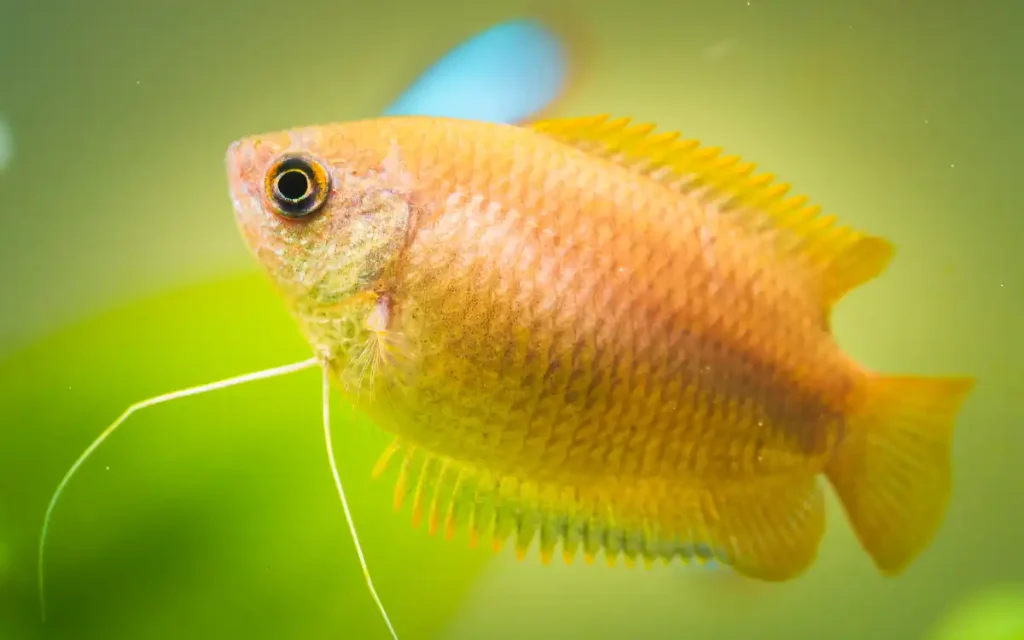
Honey Gouramis are gentle, small gouramis that do well in calm, planted community tanks. They’re shy and appreciate slow-moving tank mates and lots of plant cover. Males develop a brighter coloration, especially during breeding.
- Minimum Tank Size: 10 gallons
- Tank Position: Top to midwater
- Temperature: 72–82°F (22–28°C)
- pH Range: 6.0–7.5
- Best Tank Mates: Tetras, Corydoras, Otocinclus, Rasboras
- Why Choose This Fish? Small, peaceful, ideal for nano planted tanks
👉 Tip: Float plants to create shade and security for these shy fish.
18.White Cloud Mountain Minnow (Tanichthys albonubes)
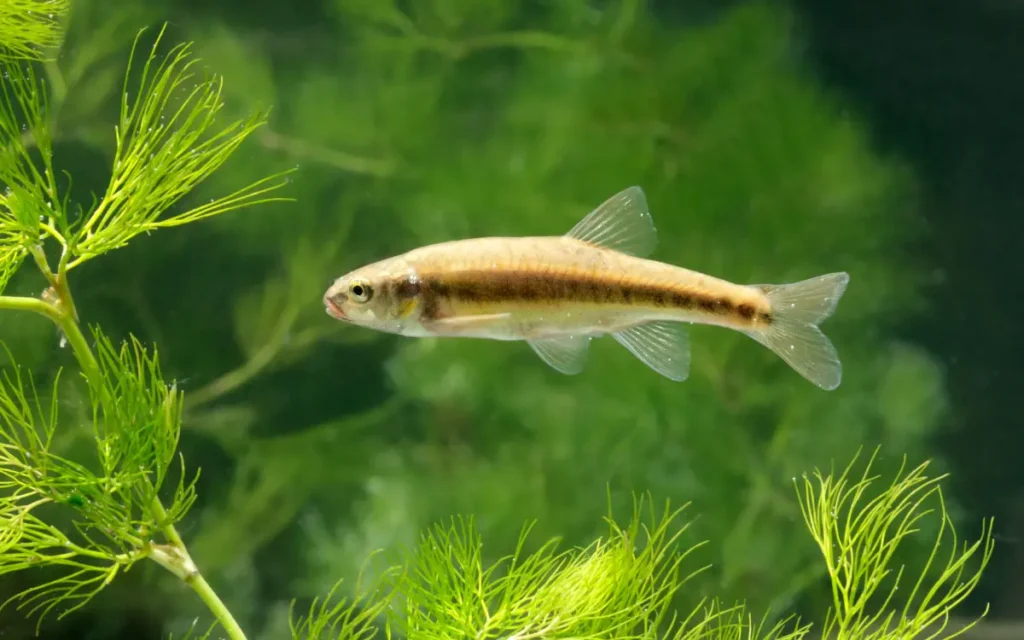
White Cloud Mountain Minnows are hardy, peaceful fish that can tolerate cooler water, making them great for unheated community tanks. They’re small, active schoolers and do best in groups of 6 or more.
- Minimum Tank Size: 10 gallons
- Tank Position: Mid to top water
- Temperature: 64–72°F (18–22°C)
- pH Range: 6.0–8.0
- Best Tank Mates: Danios, Corydoras, Rasboras, Guppies
- Why Choose This Fish? Hardy and adaptable, great for beginners and cooler tanks
👉 Tip: They show their best colors in slightly cooler water with good water movement.
19.Molly (Poecilia spp.)
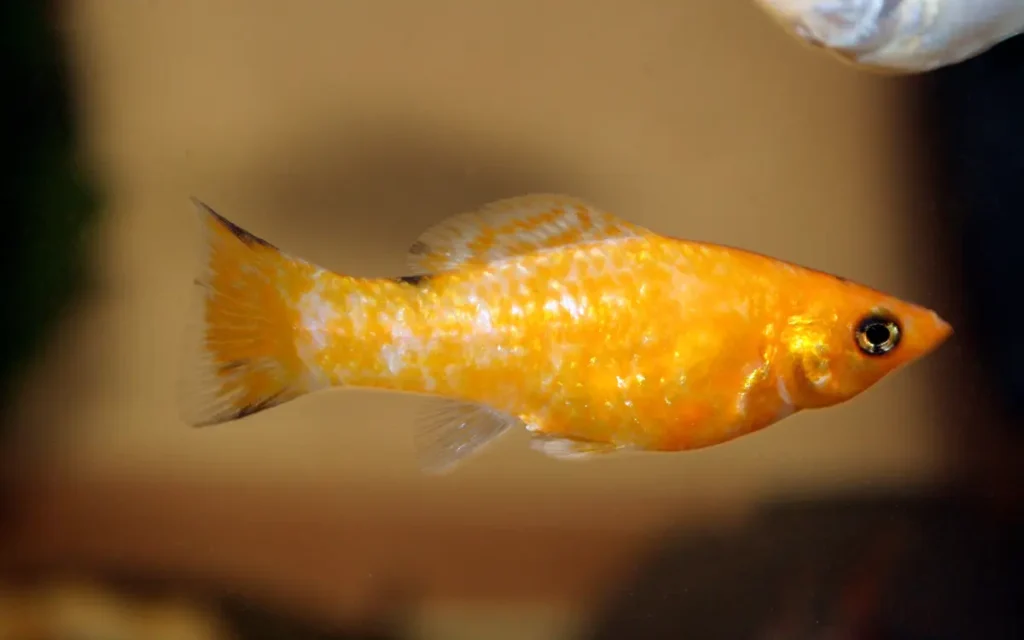
Mollies are active, colorful livebearers that do well in peaceful community tanks. They can tolerate a range of conditions, including slightly brackish water. Mollies are known for their constant movement and curiosity.
- Minimum Tank Size: 15 gallons
- Tank Position: Top to midwater
- Temperature: 72–78°F (22–26°C)
- pH Range: 7.5–8.5
- Best Tank Mates: Platies, Guppies, Corydoras, Swordtails
- Why Choose This Fish? Hardy, colorful, and active — a lively addition to community tanks
👉 Tip: Consider adding aquarium salt if keeping them in slightly brackish conditions.
20.Cardinal Tetra (Paracheirodon axelrodi)
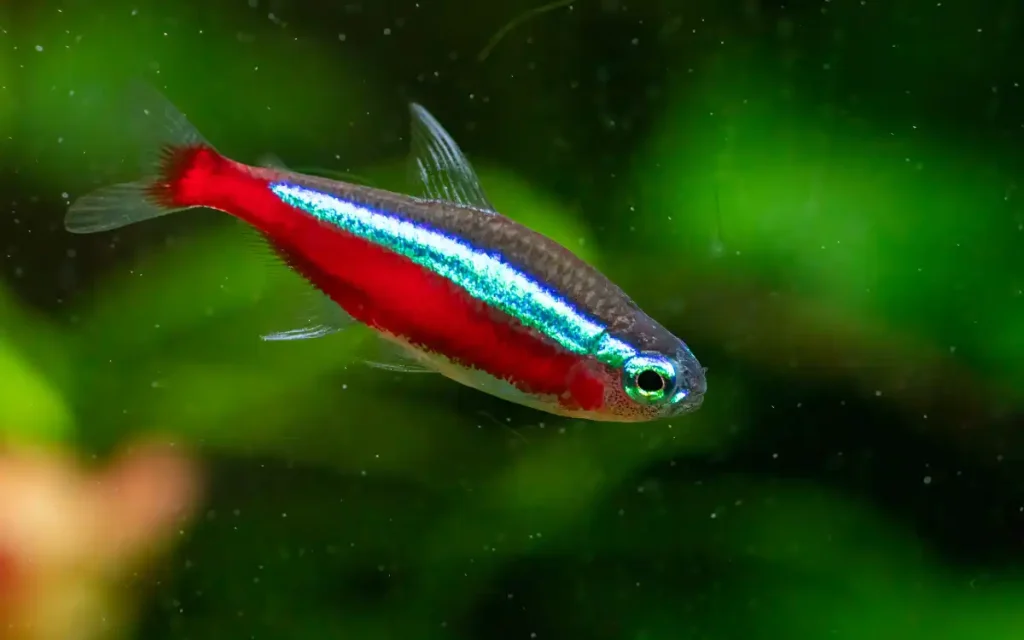
Cardinal Tetras are similar to Neon Tetras but with a more vivid red stripe that extends the length of their body. They’re peaceful, schooling fish that thrive in soft, slightly acidic water with stable conditions.
- Minimum Tank Size: 15 gallons
- Tank Position: Midwater
- Temperature: 73–81°F (23–27°C)
- pH Range: 4.6–7.0
- Best Tank Mates: Corydoras, Rasboras, Dwarf Gouramis, Shrimp
- Why Choose This Fish? Bright, striking schoolers for planted aquariums
👉 Tip: Cardinal Tetras can be sensitive during acclimation; add them carefully to avoid stress.
21.Black Skirt Tetra (Gymnocorymbus ternetzi)
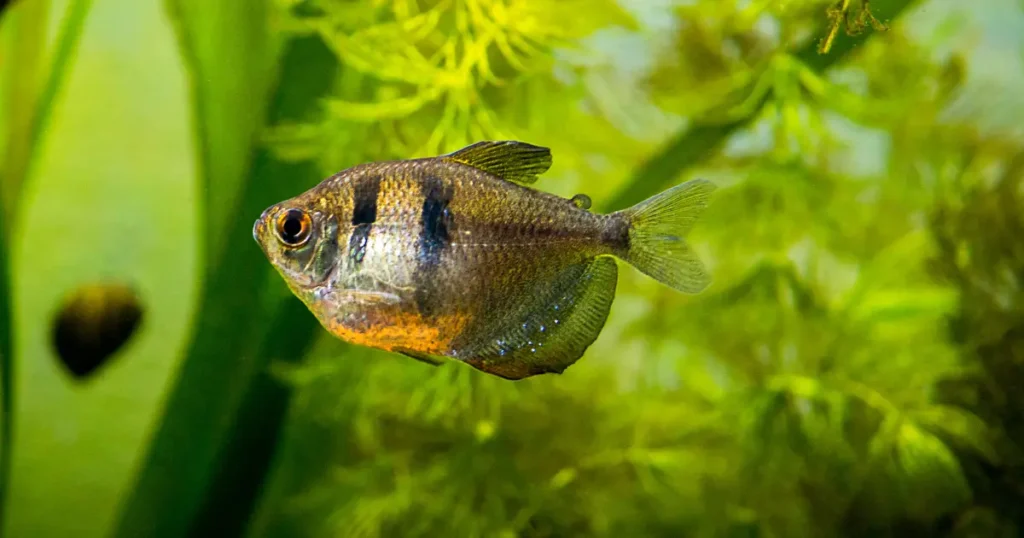
Black Skirt Tetras are hardy, peaceful fish with flowing black fins and a silver-gray body. They’re best kept in groups of 5 or more and thrive in tanks with open swimming space and plants at the edges.
- Minimum Tank Size: 20 gallons
- Tank Position: Midwater
- Temperature: 70–85°F (21–29°C)
- pH Range: 6.0–7.5
- Best Tank Mates: Barbs, Corydoras, Danios, Gouramis
- Why Choose This Fish? Hardy and striking, with graceful movement
👉 Tip: Avoid pairing with fin nippers — their long fins can be tempting targets.
22.Siamese Algae Eater (Crossocheilus oblongus)
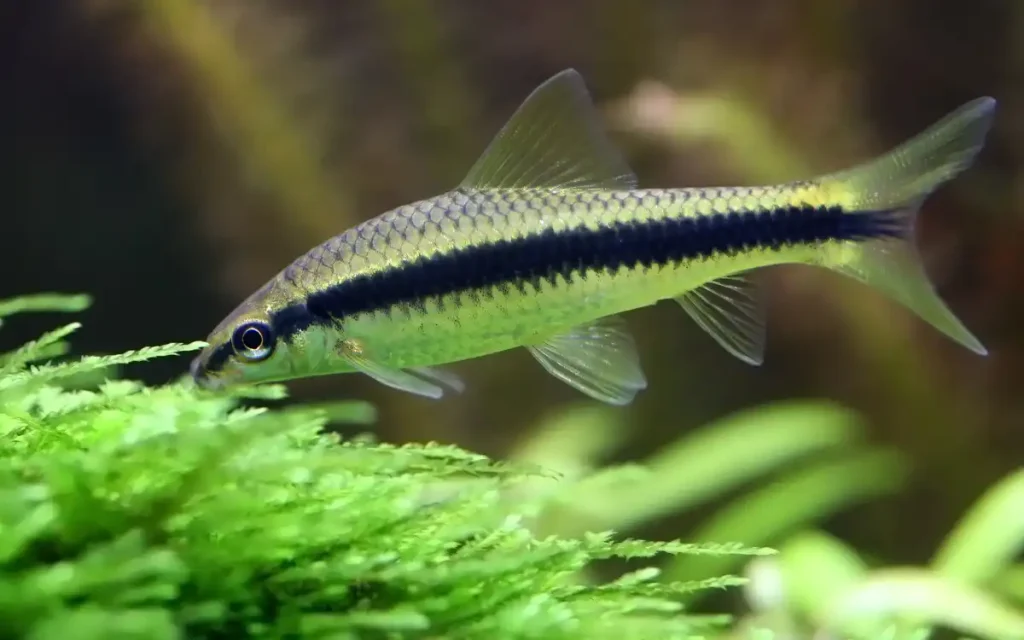
Siamese Algae Eaters are peaceful, active algae grazers ideal for larger community tanks. They’re excellent for controlling algae and are more active swimmers than Otocinclus or Plecos.
- Minimum Tank Size: 30 gallons
- Tank Position: Bottom to midwater
- Temperature: 75–79°F (24–26°C)
- pH Range: 6.5–7.0
- Best Tank Mates: Tetras, Rasboras, Corydoras, Gouramis
- Why Choose This Fish? Great algae control for medium to large community setups
👉 Tip: Keep in small groups and provide space to swim freely.
Awesome! Let’s continue with the next batch in the same detailed style:
23.Threadfin Rainbowfish (Iriatherina werneri)
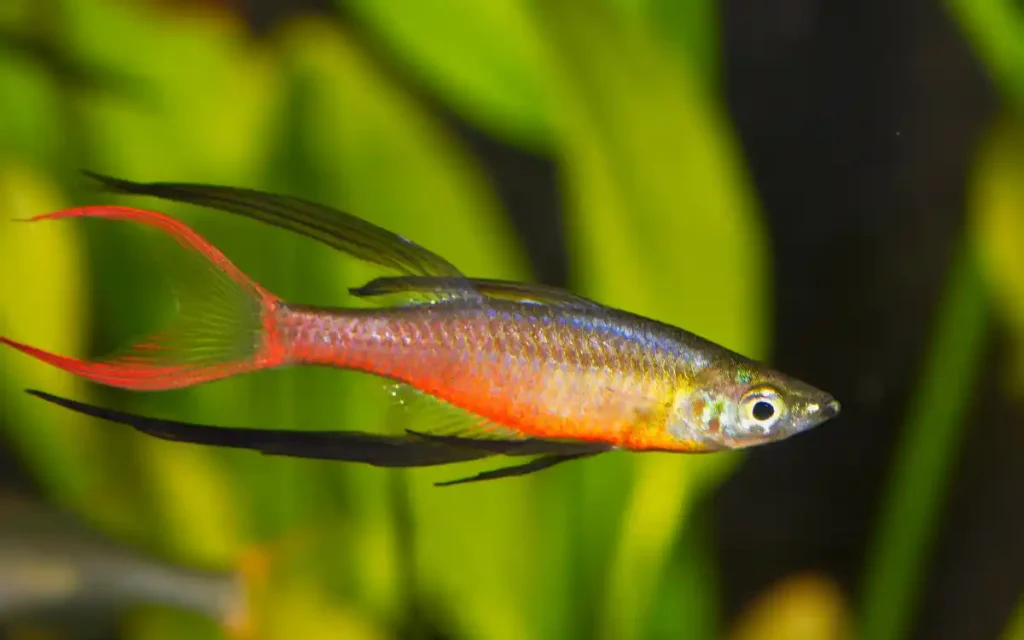
Threadfin Rainbowfish are delicate, elegant fish known for their long, flowing fins and peaceful nature. They thrive in calm, well-planted tanks with gentle water flow. Because of their fragile fins, they should not be housed with fin-nippers.
- Minimum Tank Size: 20 gallons
- Tank Position: Top to midwater
- Temperature: 75–82°F (24–28°C)
- pH Range: 6.0–7.5
- Best Tank Mates: Tetras, Rasboras, Otocinclus, Corydoras
- Why Choose This Fish? Graceful swimmer, unique fin shape, peaceful — ideal for planted aquariums
👉 Tip: Maintain excellent water quality to keep their delicate fins in top condition.
24.Peacock Gudgeon (Tateurndina ocellicauda)
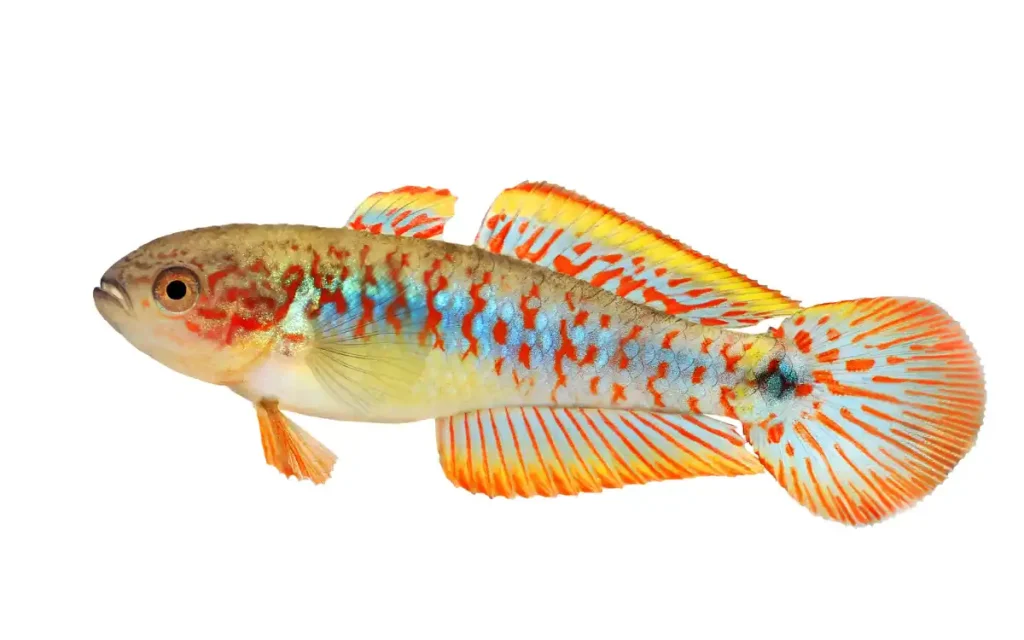
Peacock Gudgeons are small, colorful fish with striking blue and red markings. They’re peaceful and do well in planted community tanks with lots of hiding spots. These fish prefer slow-moving water and can be shy at first.
- Minimum Tank Size: 20 gallons
- Tank Position: Bottom to midwater
- Temperature: 72–79°F (22–26°C)
- pH Range: 6.5–7.5
- Best Tank Mates: Rasboras, Tetras, Corydoras, Shrimp
- Why Choose This Fish? Unique coloration and peaceful temperament, adds variety to small community tanks
👉 Tip: Provide caves or tubes for them to retreat to when feeling shy.
25.Marbled Hatchetfish (Carnegiella strigata)
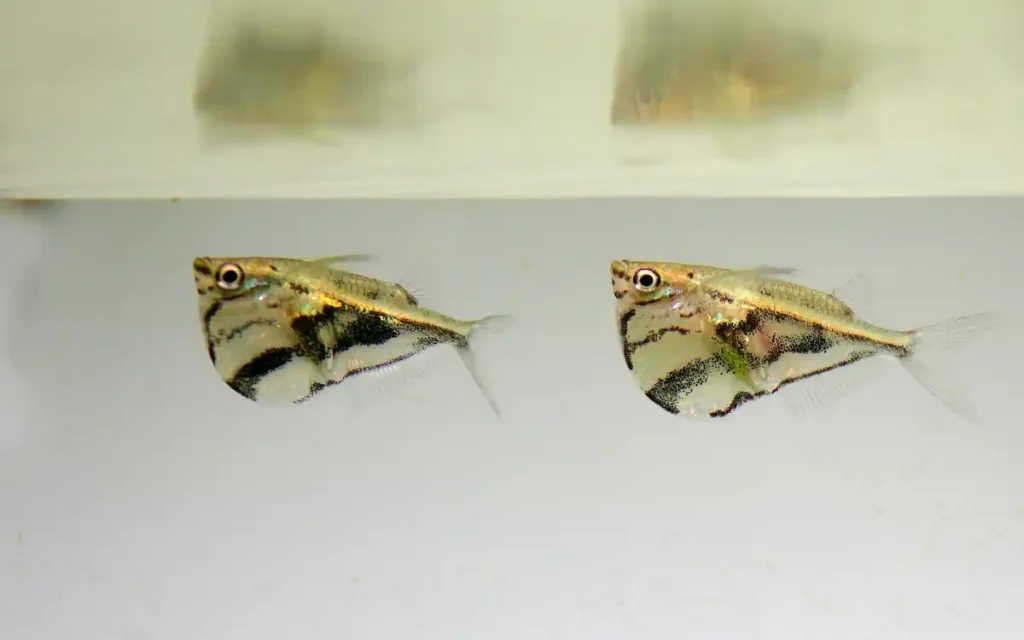
Marbled Hatchetfish are unique top-dwellers with a distinct hatchet-shaped body. They prefer tanks with floating plants and a secure lid, as they are known jumpers. Best kept in peaceful tanks with gentle filtration.
- Minimum Tank Size: 20 gallons
- Tank Position: Top water
- Temperature: 74–81°F (23–27°C)
- pH Range: 5.5–7.0
- Best Tank Mates: Tetras, Rasboras, Gouramis, Otocinclus
- Why Choose This Fish? Unique body shape and top-swimming behavior add diversity to the tank
👉 Tip: Use floating plants to help them feel secure and reduce jumping attempts.
26.Rubber Lip Pleco (Chaetostoma formosae)
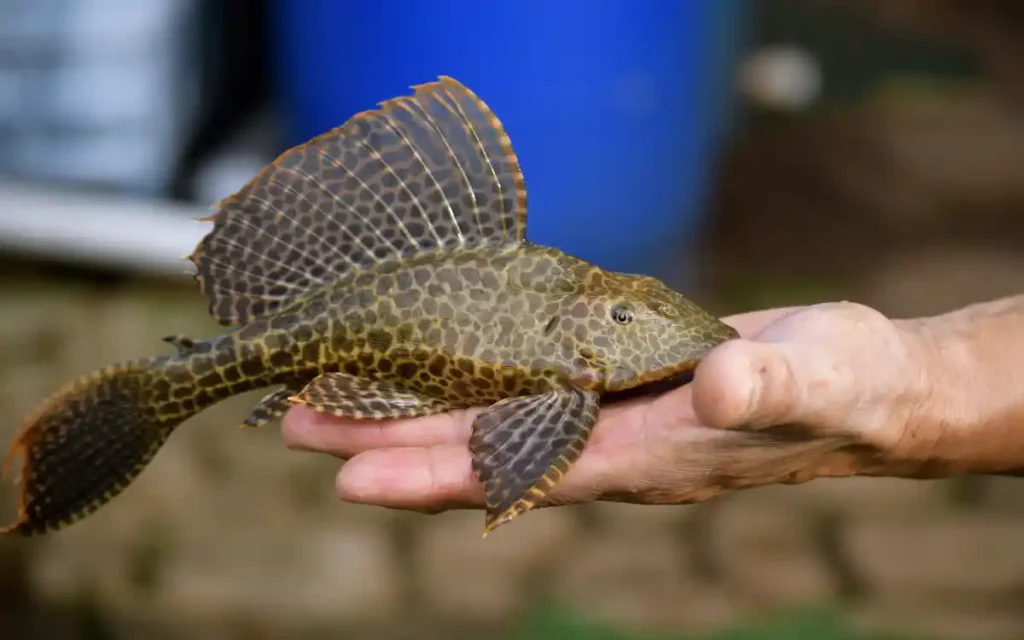
Rubber Lip Plecos are smaller than common Plecos and are excellent algae eaters for medium-sized tanks. They are peaceful and prefer tanks with good water flow and oxygen levels.
- Minimum Tank Size: 30 gallons
- Tank Position: Bottom
- Temperature: 72–78°F (22–26°C)
- pH Range: 6.5–7.5
- Best Tank Mates: Tetras, Rasboras, Gouramis, Corydoras
- Why Choose This Fish? Small algae eater with a peaceful nature, manageable size for community setups
👉 Tip: Provide driftwood and rocks for them to graze on.
27.Diamond Tetra (Moenkhausia pittieri)
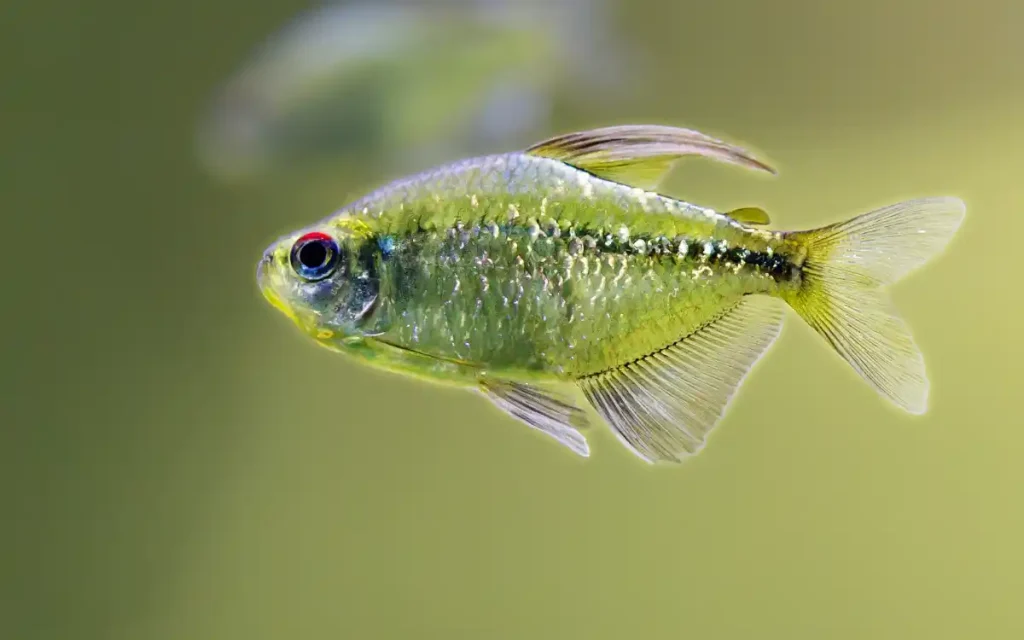
Diamond Tetras are beautiful, shimmering silver fish that brighten up any community tank. They are peaceful schooling fish that feel secure in groups of 6 or more. They appreciate open swimming areas with plants at the edges.
- Minimum Tank Size: 20 gallons
- Tank Position: Midwater
- Temperature: 75–82°F (24–28°C)
- pH Range: 6.0–7.5
- Best Tank Mates: Neon Tetras, Corydoras, Rasboras, Otocinclus
- Why Choose This Fish? Eye-catching silver shimmer and peaceful schooling behavior
👉 Tip: Use subdued lighting to highlight their reflective scales.
28.Chili Rasbora (Boraras brigittae)
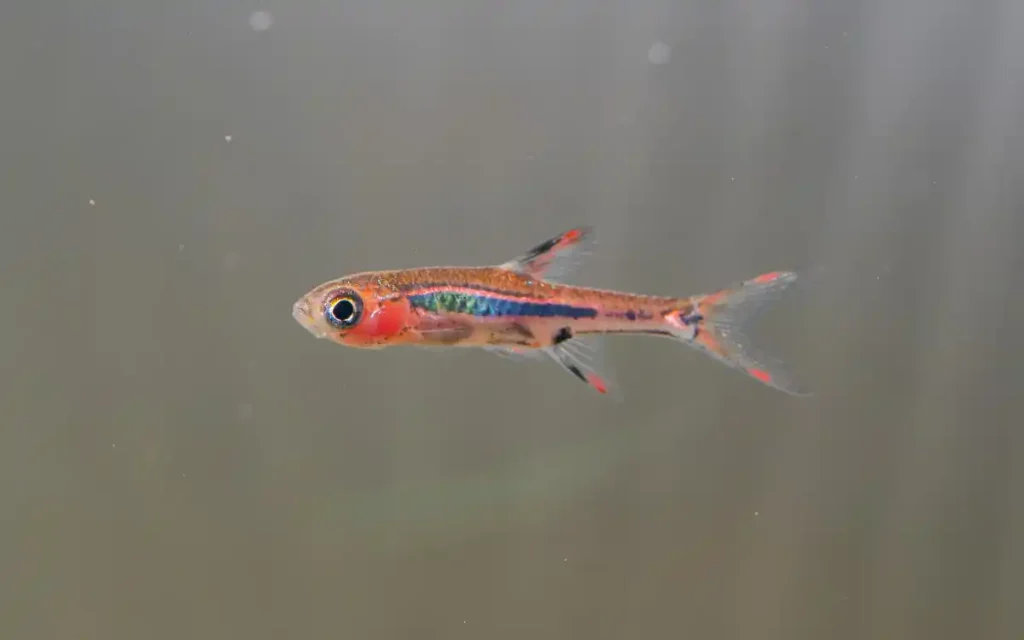
Chili Rasboras are tiny, brilliant red schooling fish perfect for nano tanks and planted aquariums. They’re peaceful and best kept in groups of 6–10 to reduce stress and bring out their best coloration.
- Minimum Tank Size: 10 gallons
- Tank Position: Midwater
- Temperature: 68–82°F (20–28°C)
- pH Range: 4.0–7.0
- Best Tank Mates: Otocinclus, Corydoras, Celestial Pearl Danios, Shrimp
- Why Choose This Fish? Perfect for nano setups, bright color, very peaceful
👉 Tip: A dark substrate and dense plants help their color stand out beautifully.
29.Bolivian Ram (Mikrogeophagus altispinosus)
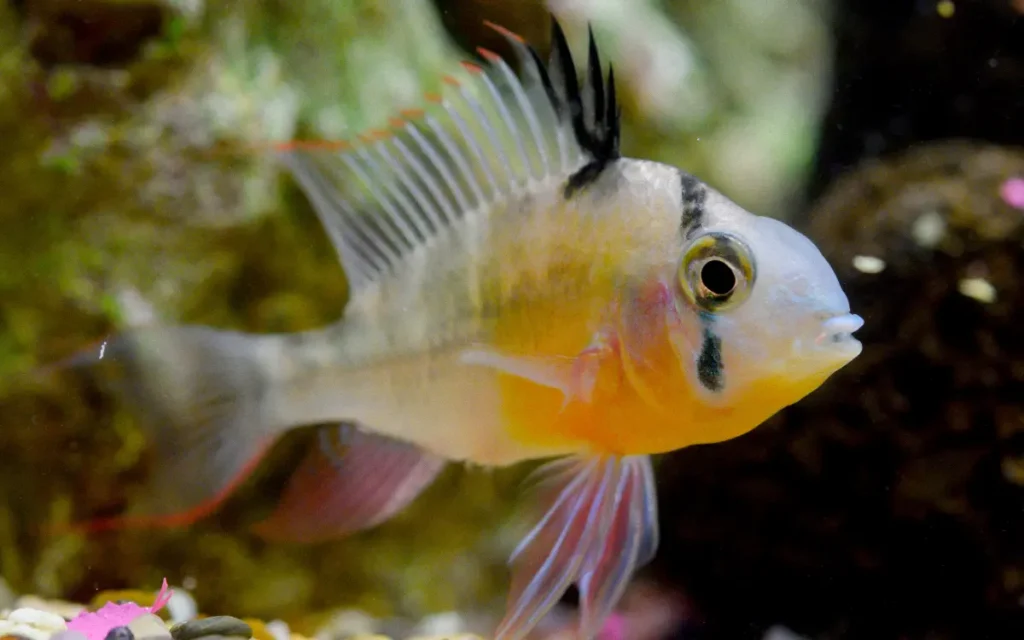
Bolivian Rams are among the most peaceful cichlids, making them a great choice for larger community tanks. They’re social, display interesting behaviors, and add a splash of subtle color.
- Minimum Tank Size: 30 gallons
- Tank Position: Bottom to midwater
- Temperature: 72–79°F (22–26°C)
- pH Range: 6.0–7.5
- Best Tank Mates: Tetras, Corydoras, Rasboras, Plecos
- Why Choose This Fish? Peaceful dwarf cichlid with personality and unique behavior
👉 Tip: Provide flat rocks and caves for natural territorial behavior.
Fantastic — let’s finish off the remaining species in the same detailed, SEO-friendly format!
30.Swordtail (Xiphophorus hellerii)
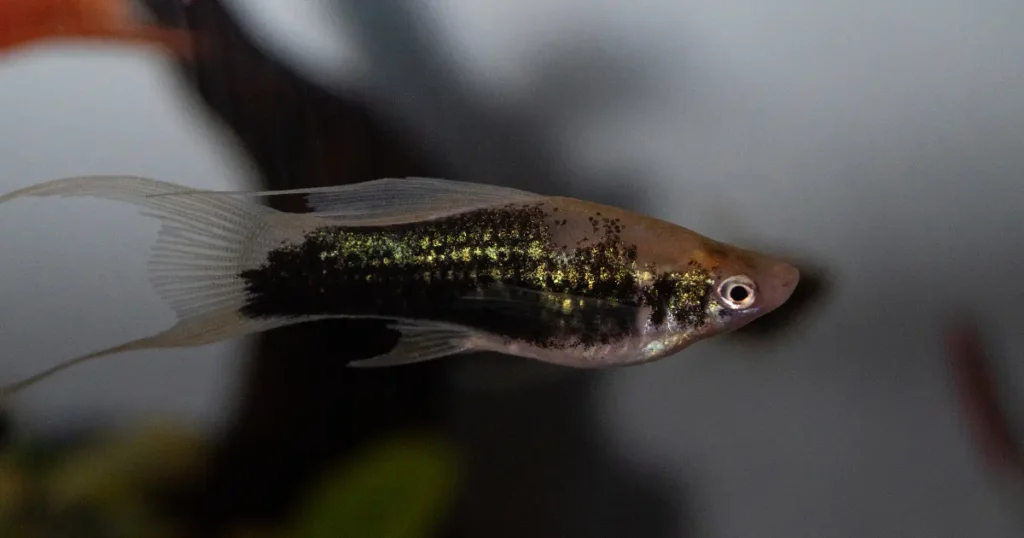
Swordtails are active, hardy livebearers known for the males’ long, sword-like tail extension. They are peaceful and do well in community tanks with other non-aggressive species. Swordtails are great for adding movement and color to mid and upper levels of the tank.
- Minimum Tank Size: 15 gallons
- Tank Position: Top to midwater
- Temperature: 72–82°F (22–28°C)
- pH Range: 7.0–8.4
- Best Tank Mates: Platies, Mollies, Guppies, Corydoras
- Why Choose This Fish? Active, colorful, and beginner-friendly livebearer
👉 Tip: Males can occasionally chase females, so keep a higher female-to-male ratio to reduce stress.
31.Rainbowfish (Melanotaeniidae family — e.g., Boesemani, Dwarf Neon)
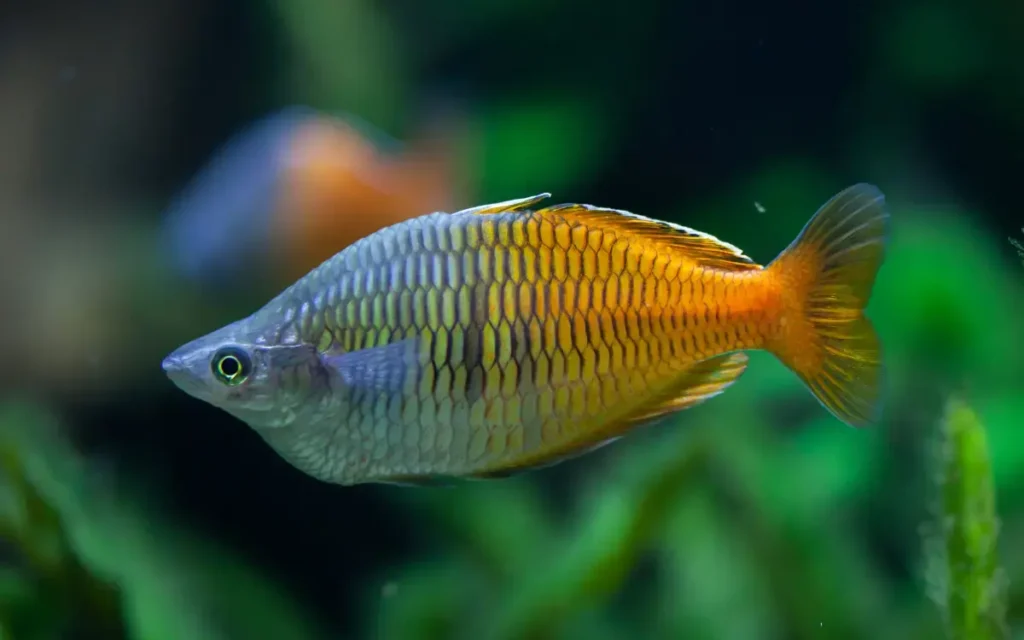
Rainbowfish bring vibrant color and energy to community tanks. These schooling fish are peaceful and thrive in larger tanks with open swimming space. They show their best colors in the morning and during spawning.
- Minimum Tank Size: 30 gallons (depending on species)
- Tank Position: Mid to top water
- Temperature: 74–80°F (23–27°C)
- pH Range: 7.0–8.0
- Best Tank Mates: Tetras, Corydoras, Rasboras, Gouramis
- Why Choose This Fish? Vibrant colors, energetic schooling behavior, ideal for larger planted tanks
👉 Tip: Keep in groups of 6+ for the best coloration and natural behavior.
32.Panda Corydoras (Corydoras panda)
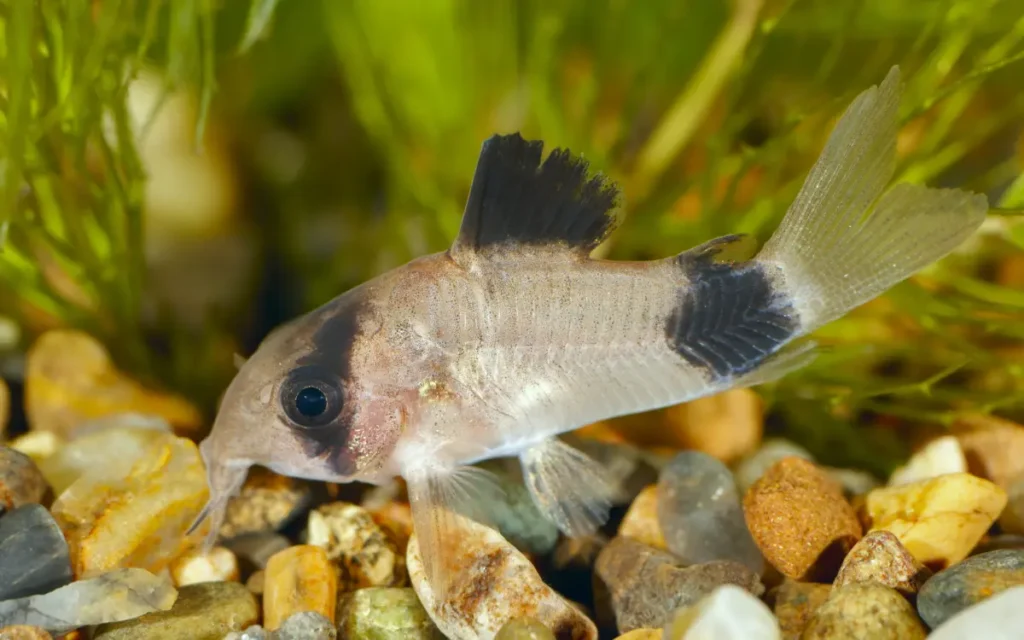
Panda Corys are small, adorable bottom-dwellers with black patches over their eyes, giving them their panda-like appearance. They’re peaceful, active in groups, and perfect for community tanks with a soft substrate.
- Minimum Tank Size: 20 gallons
- Tank Position: Bottom
- Temperature: 68–77°F (20–25°C)
- pH Range: 6.0–7.5
- Best Tank Mates: Tetras, Rasboras, Guppies, Otocinclus
- Why Choose This Fish? Cute, peaceful scavenger that helps clean the substrate
👉 Tip: Like other Corys, they thrive in groups of 6 or more.
33.Ember Tetra (Hyphessobrycon amandae)
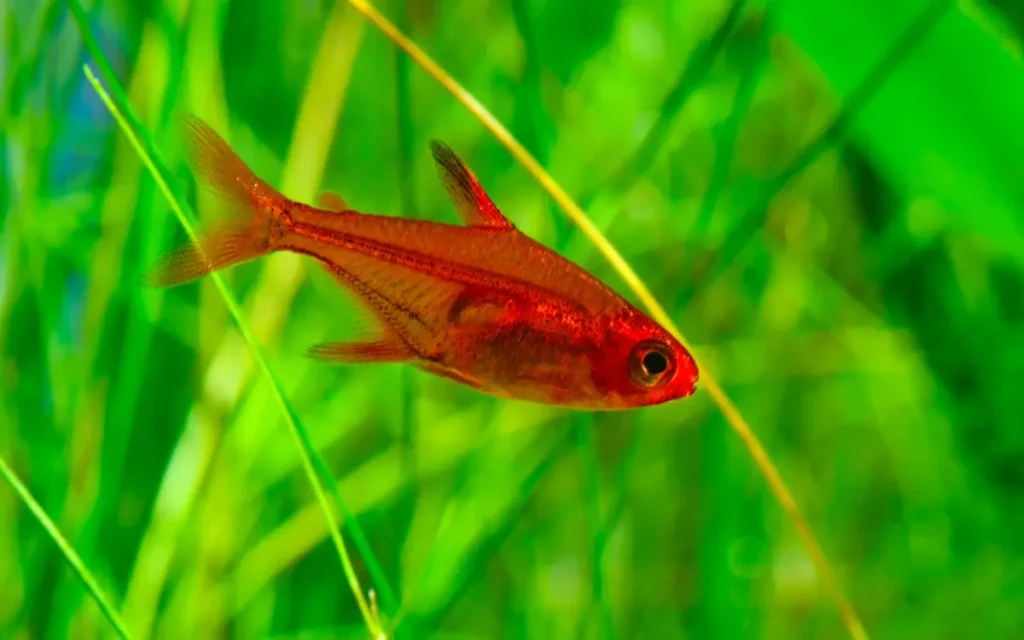
Ember Tetras are tiny, fiery orange schoolers that bring a warm glow to planted tanks. They are peaceful and thrive in groups of 8 or more, where their color intensifies against a green background.
- Minimum Tank Size: 10 gallons
- Tank Position: Midwater
- Temperature: 73–84°F (23–29°C)
- pH Range: 5.5–7.0
- Best Tank Mates: Neon Tetras, Corydoras, Chili Rasboras, Otocinclus
- Why Choose This Fish? Bright color, peaceful, and perfect for nano or planted aquariums
👉 Tip: Dark substrate and background enhance their vivid color.
34.Clown Pleco (Panaqolus maccus)
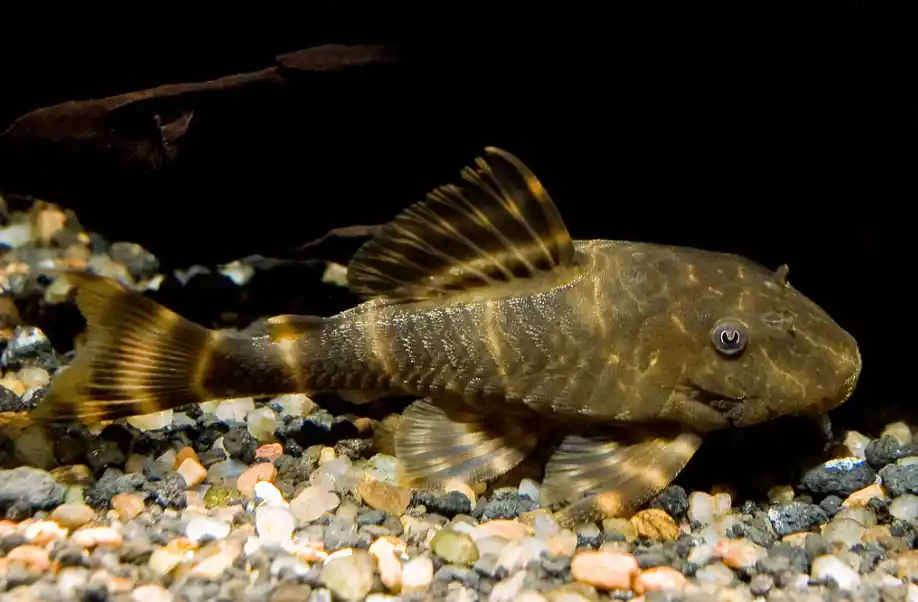
Clown Plecos are small, wood-eating plecos ideal for medium community tanks. They stay under 4 inches and are peaceful bottom dwellers that love driftwood for grazing.
- Minimum Tank Size: 20 gallons
- Tank Position: Bottom
- Temperature: 73–82°F (23–28°C)
- pH Range: 6.5–7.5
- Best Tank Mates: Tetras, Rasboras, Corydoras, peaceful Gouramis
- Why Choose This Fish? Compact size, wood grazer, peaceful algae control
👉 Tip: Include plenty of driftwood for them to rasp on.
Community Fish Compatibility Table
| Fish Species | Tank Position | Min Group Size | Min Tank Size | Aggression Level | Notes |
| Cory Catfish | Bottom | 6+ | 20 gal | Very peaceful | Needs soft substrate, social scavenger |
| Panda Corydoras | Bottom | 6+ | 20 gal | Very peaceful | Small, adorable cleaner, soft substrate needed |
| Neon Tetra | Midwater | 8+ | 10 gal | Very peaceful | Tight schoolers, best in planted tanks |
| Cardinal Tetra | Midwater | 6+ | 15 gal | Very peaceful | Needs soft, acidic water |
| Ember Tetra | Midwater | 8+ | 10 gal | Very peaceful | Bright orange, nano tanks or planted setups |
| Black Skirt Tetra | Midwater | 5+ | 20 gal | Very peaceful | Long fins, avoid fin nippers |
| Rummynose Tetra | Midwater | 8+ | 20 gal | Very peaceful | Tight schoolers, sensitive to water quality |
| Diamond Tetra | Midwater | 6+ | 20 gal | Very peaceful | Shiny scales, prefers subdued lighting |
| Guppy | Top-Mid | 3+ | 10 gal | Very peaceful | May breed rapidly, active swimmers |
| Platy | Top-Mid | 3+ | 10 gal | Very peaceful | Hardy, beginner-friendly |
| Molly | Top-Mid | 3+ | 15 gal | Very peaceful | Tolerates brackish water, active |
| Swordtail | Top-Mid | 3+ | 15 gal | Very peaceful | Males may chase females |
| Zebra Danio | Top-Mid | 6+ | 10 gal | Very peaceful | Fast swimmer, great activity fish |
| White Cloud Mountain Minnow | Mid-Top | 6+ | 10 gal | Very peaceful | Tolerates cooler water |
| Chili Rasbora | Midwater | 6+ | 10 gal | Very peaceful | Nano tanks, best with gentle tankmates |
| Celestial Pearl Danio | Midwater | 6+ | 10 gal | Very peaceful | Stunning nano fish, dense plants preferred |
| Harlequin Rasbora | Midwater | 6+ | 10 gal | Very peaceful | Schooling, hardy |
| Dwarf Gourami | Top-Mid | 1-2 | 20 gal | Peaceful, territorial to own species | Needs cover, avoid aggressive fish |
| Honey Gourami | Top-Mid | 1-2+ | 10 gal | Very peaceful | Shy, prefers float plants |
| Pearl Gourami | Top-Mid | 1-2 | 30 gal | Very peaceful | Shy, avoid fin nippers |
| Threadfin Rainbowfish | Top-Mid | 6+ | 20 gal | Very peaceful | Delicate fins, gentle tankmates only |
| Rainbowfish (general) | Mid-Top | 6+ | 30 gal | Very peaceful | Colorful, active schooler |
| Peacock Gudgeon | Bottom-Mid | Pair or group | 20 gal | Very peaceful | Needs caves, shy |
| Kuhli Loach | Bottom | 3+ | 20 gal | Very peaceful | Nocturnal, loves hiding spots |
| Otocinclus Catfish | Bottom | 4-6+ | 10 gal | Very peaceful | Needs algae/biofilm, mature tank required |
| Siamese Algae Eater | Bottom-Mid | 3+ | 30 gal | Very peaceful | Great algae control, active |
| Rubber Lip Pleco | Bottom | 1+ | 30 gal | Very peaceful | Needs oxygen-rich water, rocks |
| Clown Pleco | Bottom | 1+ | 20 gal | Very peaceful | Wood grazer, small algae eater |
| Bala Shark | Mid-Bottom | 3+ | 75 gal | Very peaceful | Needs large tank, fast swimmer |
| Pictus Catfish | Bottom | 1+ | 55 gal | Peaceful, fast | Energetic, needs hiding spots |
| Glass Catfish | Midwater | 5+ | 30 gal | Very peaceful | Transparent, needs stable conditions |
| Bolivian Ram | Bottom-Mid | Pair or small group | 30 gal | Very peaceful | Dwarf cichlid, unique behavior |
FAQ’s
What are the best community fish for beginners?
The best beginner community fish include Neon Tetras, Guppies, Platies, Cory Catfish, and Zebra Danios. They are hardy, peaceful, and easy to care for.
How many community fish can I keep in a 20-gallon tank?
In a 20-gallon tank, you can keep around 12–15 small peaceful fish, such as tetras or rasboras, depending on the species and tank setup.
Can you mix different species of tetras in a community tank?
Yes, different peaceful tetra species like Neon, Cardinal, and Rummynose Tetras can coexist if kept in proper group sizes with stable water conditions.
What is the ideal temperature for community fish?
Most community fish thrive at 72–78°F (22–26°C), which suits species like tetras, guppies, rasboras, and corydoras.
Do community fish need live plants?
While not required, live plants help create a natural, stress-free environment for community fish, offering cover and improving water quality.
Are community fish aggressive?
No, community fish are selected for their peaceful nature and compatibility with other gentle tank mates.

 **2. Platy** Platies are hardy and easygoing. They enjoy swimming in groups and come in a variety of bright colors. Great for peaceful community tanks. ➡️ [Platy Fish Guide →](#) **3. Zebra Danio** Known for their energy and toughness, zebra danios are perfect for cycling new tanks. They tolerate a wide range of conditions and like to dart around in groups. ➡️ [Zebra Danio Guide →](#) **4. Corydoras Catfish** Peaceful bottom-dwellers that help keep your tank clean. Keep them in groups of 3 or more and give them soft substrate. ➡️ [Cory Catfish Care →](#) **5. Molly** Adaptable to various water conditions (even brackish), mollies are lively and great for community aquariums. ➡️ [Molly Fish Care Guide →](#) **6. Swordtail** Easy to care for and great in peaceful groups. Males have a signature sword-like tail and love swimming space. ➡️ [Swordtail Fish Guide →](#) **7. Betta Fish** Low-maintenance and visually stunning. Best kept alone or with very peaceful tank mates like snails or Corydoras. ➡️ [Full Betta Fish Care Guide →](#) **8. Neon Tetra** Small and peaceful, neon tetras love to school and light up a planted tank. Keep them in groups of 6 or more. ➡️ [Neon Tetra Care Guide →](https://oceanbitez.com/neon-tetras/) **9. Harlequin Rasbora** A calm and schooling species that fits right into community setups. Easy to feed and care for. ➡️ [Harlequin Rasbora Guide →](#) **10. Dwarf Gourami** A gentle and colorful addition to a beginner’s tank. Likes planted environments and peaceful neighbors. ➡️ [Dwarf Gourami Guide →](#) **11. White Cloud Mountain Minnow** Can live in cooler temperatures and is perfect for unheated tanks. Small, peaceful, and easy to care for. ➡️ [White Cloud Minnow Guide →](#) **12. Cherry Barb** Peaceful and social, cherry barbs do well in planted tanks and enjoy being in small groups. ➡️ [Cherry Barb Care →](#) --- ### Sample Beginner Tank Combos **Combo 1: 10–15 Gallon Easy Starter** * 4–6 Guppies * 3 Corydoras Catfish * 1 Nerite Snail **Combo 2: 20 Gallon Planted Community** * 6 Harlequin Rasboras * 6 Neon Tetras * 1 Dwarf Gourami * 3 Otocinclus (optional if algae control is needed) --- ### Beginner Tips for a Successful Aquarium * Cycle your tank before adding fish (ammonia → nitrite → nitrate) * Start with hardy species before delicate ones * Feed small amounts once or twice daily * Do weekly partial water changes (20–30%) * Don’t mix aggressive or fin-nipping species * Use a heater for tropical fish (75–80°F) --- ### Final Thoughts These beginner fish are ideal for getting started in the hobby without frustration. They're low-maintenance, compatible, and fun to watch. Once you’re comfortable, you can explore more advanced species and community combinations. ➡️ Check out our full guide to [Freshwater Aquarium Fish →](https://oceanbitez.com/freshwater-fish/)](https://oceanbitez.com/wp-content/uploads/2024/06/Best-Freshwater-Fish-for-Your-Aquarium-1024x640.webp)
